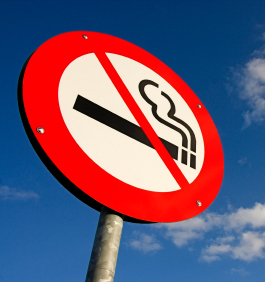 Smoking and lung cancer. The link between those two words has led to advertising restrictions, giant warning labels, and cleaner air in restaurants and bars across the country. Most people, even those crowded together under awnings to puff away on rainy days, know that smoking is a huge risk factor for lung cancer.
Smoking and lung cancer. The link between those two words has led to advertising restrictions, giant warning labels, and cleaner air in restaurants and bars across the country. Most people, even those crowded together under awnings to puff away on rainy days, know that smoking is a huge risk factor for lung cancer.
Smoking and breast cancer, on the other hand, is a less common pairing. That may change, however: an increasing volume of research is pointing to smoking as one of the several risk factors for breast cancer. It’s not just our lungs we need to worry about, and recent studies are showing that the younger a smoker picks up her bad habit, the higher her risk becomes.
The connection between lung cancer and smoking is obvious to most, but what exactly is the link between smoking and breast cancer? Tobacco—whether smoked, chewed, or exposed secondhand—is a carcinogen, a toxic category of substance that can cause or aggravate the growth of tumors. The carcinogenic cells found in tobacco are inhaled through our lungs, yes, but are then absorbed into our bloodstream. Once in the blood, they flow into other parts of the body, including the breast, where research suggests their presence increases the likelihood of cancer growth in an already tumor-prone area.
Although breast cancer statistics generally show a lower risk for women under 40, when smoking is concerned, youth is not an advantage. The risk of developing breast cancer is much higher when a woman starts smoking at a young age. Researchers believe when a woman starts smoking very early in life, her breast tissue is still developing, and thus more sensitive to the influence of these carcinogens.
Age isn’t the only factor at play. A certain part of the breast tissue called the epithelium will undergo even further development during a full-term pregnancy. The wonderful result of this development is a lower risk for breast cancer later in life. Unfortunately, this also means that if a woman starts smoking before her first full-term pregnancy (that is, before her breasts can complete their cancer-resistant development) the data shows that she is at a higher risk for breast cancer than if she had waited until after her child was born to pick up the habit.
This only serves to underscore a core belief of the Maurer Foundation: it’s not just women who need to be informed about breast cancer, but girls, and in their most formative years. Our youth breast health programs educate and empower young women to make the healthiest choices possible when they matter the very most.
If you agree, and want to help our mission of breast cancer prevention and education, contact us about hosting a breast health program in a school or organization in your community today!